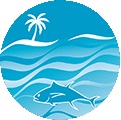Pacific Islands Forum Fisheries Agency facts for kids

Logo of the Pacific Islands Forum Fisheries Agency
|
|
| Abbreviation | FFA |
|---|---|
| Formation | 9 August 1979 |
| Type | International organization |
| Purpose | Fisheries management |
| Headquarters | Honiara, Solomon Islands |
|
Area served
|
Pacific Ocean |
|
Membership
|
17 state members |
|
Director General
|
Noan David Pakop |
The Pacific Islands Forum Fisheries Agency (FFA) is an important group that helps countries in the Pacific Ocean work together. It was started in 1979. The main goal of the FFA is to make sure that fish in the Pacific are caught in a smart way. This helps keep enough fish for the future and benefits the people who live in the region.
The FFA focuses on managing fish that travel long distances, like tuna. Its main office is in Honiara, which is the capital city of the Solomon Islands. The FFA also runs a special center called the Regional Fisheries Surveillance Centre. This center helps keep an eye on fishing activities. Every year, the FFA helps organize an event called Operation Kurukuru. This operation checks fishing boats that might be fishing illegally.
Contents
What is the FFA and How Did It Start?
The FFA was created after a meeting of leaders in 1977. It officially began in 1979 with an international agreement called the South Pacific Forum Fisheries Agency Convention. Fourteen countries signed this agreement at first. Most of these were small island nations in the Pacific. Australia and New Zealand also joined. In 2002, Tokelau became a member too.
The FFA is based in Honiara, Solomon Islands. It helps its member countries manage their fishing areas. This ensures that fishing is done fairly and sustainably.
Who Are the Members of the FFA?
Today, the FFA has 17 member countries and territories. They all work together to protect the valuable fish resources in the Pacific Ocean.
Who Leads the FFA?
The person in charge of the FFA is called the Director General. As of 2025, the Director General is Noan Pakop from Papua New Guinea. The Deputy Director General is Pio Manoa from Fiji.
Many important people have led the FFA over the years. Here are some of the past leaders:
- Wilfred (Bill) Razzell (1979-1980)
- Philipp Muller (1981-1991)
- Peter Kenilorea (1991-1994)
- Feleti Teo (2000-2006)
- James Movick (2012-2018)
- Manumatavai Tupou (2018-2024)
What Does the FFA Do?
The FFA helps its member governments work together on fishing rules. They focus on managing tuna, which is a very important fish in the Pacific. The FFA helps countries create and agree on different plans and treaties. These agreements help protect tuna and make sure fishing is done responsibly.
Important Agreements and Activities
- The Nauru Agreement (PNA): This is an agreement among some FFA members. It helps manage tuna fishing, especially for purse-seine boats. These boats use large nets to catch fish. The agreement sets limits on how much fishing can happen in certain areas. It also requires observers on fishing boats to make sure rules are followed.
- The Tokelau Arrangement (TKA): This agreement started in 2014. It helps manage albacore tuna, which is often caught by longline fishing. The countries involved are working to set limits on how much albacore tuna can be caught.
- The WCPFC Convention: FFA members played a big part in creating this important convention in 2004. The WCPFC helps manage highly migratory fish, like tuna, across a large part of the Pacific Ocean. FFA members continue to suggest new ways to protect these fish.
- The Niue Treaty: This treaty helps countries work together to stop illegal fishing. It allows countries to share information and resources, like patrol boats. This makes it harder for illegal fishing boats to escape.
- The US Treaty: This agreement allows fishing boats from the United States to fish for tuna in the waters of Pacific Island countries. It has been in place since 1987 and helps manage access to these fishing grounds.
- Harmonized Minimum Terms and Conditions (MTCs): These are guidelines that FFA members use to create their own national fishing rules. They help make sure that all countries have similar rules for foreign fishing boats. This makes fishing fairer and easier to manage across the region.
- Operation Kurukuru: Since 2005, this operation happens every year. It is a joint effort to fight illegal, unreported, and unregulated fishing. The Regional Fisheries Surveillance Centre helps coordinate this important work.
Besides managing fishing rules, the FFA also helps its member countries develop their fishing industries. This includes looking at economic opportunities and helping countries meet international standards for selling fish. They work to make sure that fish from the Pacific Islands can be sold in major markets around the world.
See also
- South Pacific Tuna Treaty
 | Janet Taylor Pickett |
 | Synthia Saint James |
 | Howardena Pindell |
 | Faith Ringgold |

